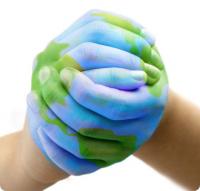Scientists at AGU bring holistic new view to sustainability challenges
Add Summary

Global sustainability is a demanding taskmaster in the research world because achieving sustainability requires everything to be understood simultaneously. Blind spots can mean missing critical opportunities to affect positive change.
Big pressure and high stakes, yet international groups of scientists are gathering at the upcoming American Geophysical Union (AGU) fall meeting, Dec. 12-16 in San Francisco to explore a new integrated way to examine some of the world’s biggest challenges. Included amongst them are scientists funded by NSF's Program on Dynamics of Coupled Natural and Human Systems, jointly supported by directorates for Social, Behavioral & Economic Sciences; Biological Sciences; and Geoscience.
The new way to study is “telecoupling” – a framework that can help make sense of a world that has become more connected – with faster and more socioeconomic and environmental interactions over distances. They say the telecoupling framework describes how distance is shrinking and connections are strengthening between nature and humans.
more connected – with faster and more socioeconomic and environmental interactions over distances. They say the telecoupling framework describes how distance is shrinking and connections are strengthening between nature and humans.
On Thursday, Dec. 15, scientists from universities in the United States and from institutions in China, Brazil, Spain, Nepal and Argentina will join to explore ways to capture, study and manage complexities in a changing world.
Telecoupling was introduced by Jianguo “Jack” Liu, a sustainability scholar at Michigan State University, a few years ago and has gained traction being applied to international trade, global water supplies, food security and more.
“The interconnected world is changing at an unprecedented rate, and global sustainability challenges have grown more pressing,” said Liu, the Rachel Carson Chair in Sustainability who directs MSU’s Center for Systems Integration and Sustainability. “The concept of telecoupling helps untangle complexity of interconnections, understand unintended consequences of global challenges, and spot overlooked impact. It is shining light on areas otherwise unobserved.”
The Dec. 15 morning session, led by Liu and Falk Huettmann of University of Alaska Fairbanks, features eight presentations dealing with issues ranging from urban water sustainability to global dynamics of vegetation and sand and palm oil conservation.
Links to the presentations can be found here:
- Telecoupling Framework as an Integrated Platform to Capture, Study, and Manage Complexity in a Changing World
- Applying Telecoupling Framework for Urban Water Sustainability Research and Management
- Effects of Telecoupling on Global Vegetation Dynamics
- Quantifying multiple telecouplings using an integrated suite of spatially-explicit tools
- Current frontiers and future directions of telecoupling research
- Global sand trade is paving the way for a tragedy of the sand commons
- A first telecoupling analysis of multi-species poaching trade in Nepal: When outside demands seek and distribute a local resource in times of globalization
- Telecoupled governance of land use change: Sustainable palm oil conservation benefits limited by preferential certification
- A model-based telecoupling analysis for the Patagonian shelf: a new suggested template on how to study global seabirds-fisheries interactions for sustainability



 Print
Print Email
Email




